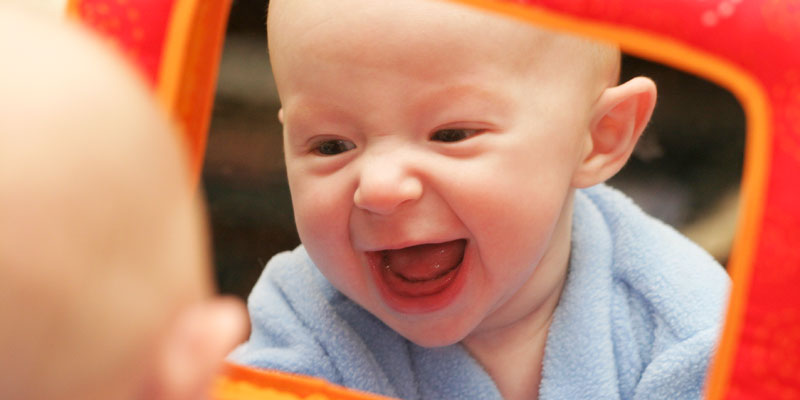
Who’s That Baby in the Mirror? Your Child’s Self-Concept Development
Did you know your baby is not born knowing that he is his own person? In fact, young babies believe that they are one and the same with their primary caregiver.1 This makes sense, in his mind, anyway, since he spends most of his time with you, whether he’s feeding, getting his diaper changed, bathing or playing. You and your baby are very much like two peas in a pod during his young infancy! It’s hard to imagine, but Self-Concept development happens gradually. Starting sometime during your baby’s 3-6 month period, he will start to make the connection that he is a distinctly separate individual compared to others around him.
(SPECIAL OFFER: Sign up for Playful Bee’s Bee Well developmental learning program to give your baby the best start in life. The first 10,000 children enroll for FREE! Sign up today.)
While he may not fully understand this until he’s about 18 months old,2 you can support his Self-Concept development by pointing out his self-image and identifying him whenever possible. Most babies love looking at their own reflections in the mirror, though they may be wondering who the other baby is!3 Try standing in front of a wall mirror and making funny faces for him to respond to and mimic. Or, place an unbreakable mirror in front of your baby during tummy time and watch him focus on the curious looking kid looking at him, as he pushes his upper body up to return the child’s gaze. He will likely be more captivated by all of the movements seen in the mirror during his early infancy, but he will come to appreciate his reflection as another little playmate by the time he reaches 6 months old.4
Your baby will also enjoy looking at photos of himself and familiar people he cares about, including his parents and other family members.5 This is a great time to share close-up photos of people from your family trips, holiday gatherings, and special moments together. Point out and name each person, especially images of him, in the photos. Describing what the people are doing and wearing and where they are will help build his vocabulary as well!5
The most important thing you can do to develop your baby’s Self-Concept is to support and nurture Attachment and Trust with one another. At this stage, it is especially important to be a responsive and loving caregiver. By consistently and lovingly meeting his needs and expectations, he will understand that he is important, valued, and unconditionally loved.6 Once he feels safe and loved, your baby will be able to develop his self-worthiness and self-esteem, building a strong foundation of his Self-Concept.
Play Tips:
Do you want to know how you can support your baby’s development of these Self-Concept skills at this age? It’s easy! Read on for some simple tips to incorporate it into your daily play time together.
- Place an unbreakable mirror securely inside the crib or play area. Your baby will be very interested in looking at his face and following his own movements in the mirror during this period.
- Show and tell a variety of family photos.5 Be sure to use photos that highlight people’s faces up close so that your baby can begin to identify each person as you tell him their names.
- Use your baby’s name whenever possible.7 Your baby will begin to understand that he is an individual when you “personalize” all conversations and experiences together. Use his name every time you speak to him and consider substituting his name for characters in nursery rhymes and songs.
- Respond positively whenever possible. Your baby’s self-concept at this stage is largely tied to his relationship with his primary caregiver. The more positive responses he receives from you and his other caregivers at this age, the stronger he will come to believe in his own abilities and the more self-confidence he will develop.
(SPECIAL OFFER: Sign up for Playful Bee’s Bee Well developmental learning program to give your baby the best start in life. The first 10,000 children enroll for FREE! Sign up today.)
Developmental Milestones:
Has your baby achieved the following Self-Concept developmental milestones yet? If yes, check off all the skill(s) he has already mastered to date using Playful Bee’s developmental milestones tracker. It’s absolutely FREE and easy to use, just click HERE!
- Enjoys looking at self in mirrors.
Sources:
1What to Expect. Self-Recognition – When Toddlers Know Who That Kid in the Mirror Is. What to Expect. Retrieved February 11, 2014, from http://www.whattoexpect.com/toddler/toddler-growth-and-development/self-recognition.aspx.
2Amerterdam, Beulah (1972). Mirror self-image reactions before age two. Developmental Psychology, 5(4), 297-305.
3Utah Department of Workforce Services, Office of Child Care. Utah’s Early Learning Guidelines: Birth to Age Three.
4Lewis, M., and Brooks-Gunn, J. (1979). Social cognition and the acquisition of self. New York, NY: Plenum Press.
5Maryland State Department of Education (2010). Healthy Beginnings: Supporting Development and Learning from Birth through Three Years of Age.
6Nugent, Dr. Kevin, and Morell, Abelardo (2011). Your Baby Is Speaking to You. New York, NY: Houghton Mifflin Harcourt Publishing Company.
7California Department of Education (2009). California Infant/Toddler Learning and Development Foundations.
Playful Bee
Latest posts by Playful Bee (see all)
- Have a Super Fortune Cookie Friday! - February 9, 2018
- All Kinds of Shapes: Your Child Is Learning Simple Shapes, and Drawing Them Too! - November 13, 2017
- Fishing for Sneakers: Create your own Hand-Eye Coordination Fun - November 11, 2017

+ There are no comments
Add yours